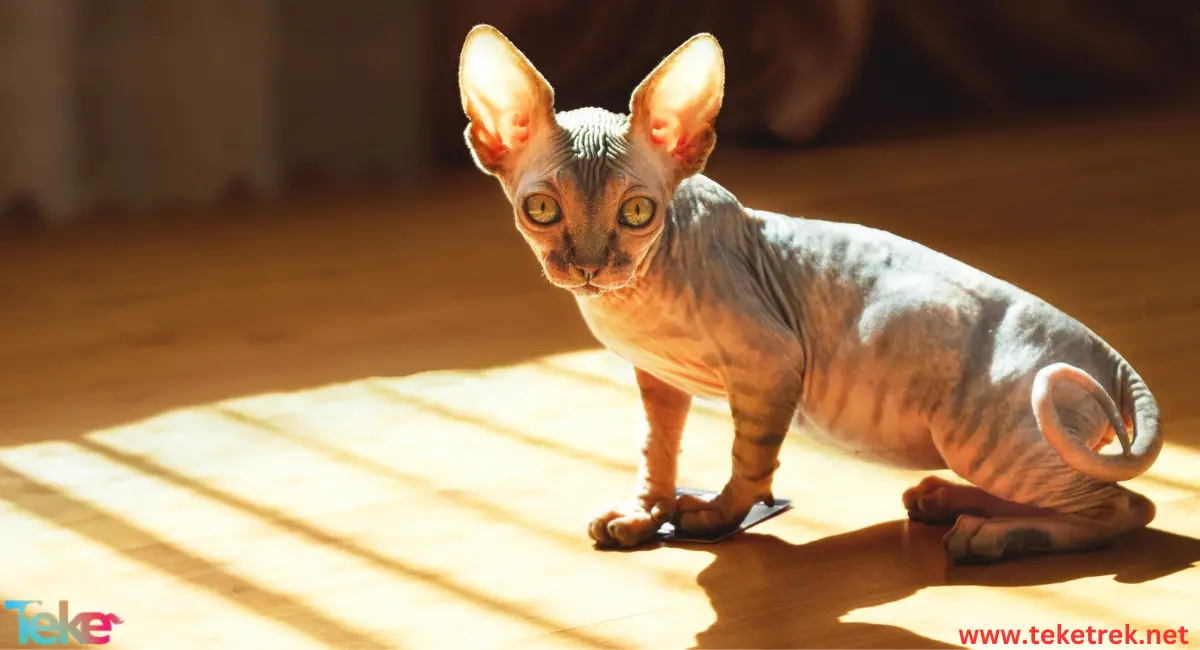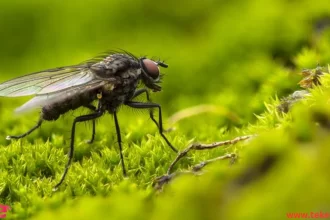The Sphynx cat is one of the strangest and rarest cat breeds in the world, due to its royal appearance and unique features that are different from other types of cats, which made it fertile material on which previous legends were based.
The name of this cat is linked to the most ancient civilization in the world full of secrets, which is the civilization of the ancient Egyptians, where a great similarity was observed between it and the cats engraved on the walls of Egyptian temples, in addition to the cats found in Egyptian hieroglyphs.
Let’s learn more about it from teketrek.

An introduction to the Pharaonic cat
The origin of Pharaonic cats goes back to Canada, where the first case of a cat without fur appeared in the city of Toronto in 1966, as a result of a genetic mutation that led to the absence of fur and the appearance of light and soft hair, which was discovered by a cat named (Brun). Then successive attempts were made to breed cats without fur, but the gene responsible for this was recessive, so some of them were devoid of hair and others were not.
This cat breed made its way to America, where many experts bred cats with the newly found gene that produces this breed, and it is still one of the most prominent pets in North America and has gained wide popularity in Western Europe.
In 2005, the Chinese cat breed was recognized by the International Cat Association, and in 2002 it was recognized by the Fanciers Association, in addition to a group of independent cat clubs in Europe. However, many pedigree cat registries do not recognize it because they believe that the lack of fur is a harmful genetic defect that has an impact on the cat’s health and longevity.
Types of Pharaonic cat
As we mentioned at the beginning, Pharaonic cats are a breed of cats that do not have fur and are known in several forms that we can distinguish between as follows:
Pharaonic Cat Mink Pattern.
Pharaonic tortoiseshell cat
Tappy striped sphynx cat.
The Pharaoh cat, which has two colors BI-Color.
Pharaonic cat Pointed Pattern.
Pharaonic calico cat
Solid Color Pharaoh Cat.
The shapes we mentioned previously help us easily recognize this distinctive cat when we see it in movies or when we encounter it in real life.
Physical and personality traits of the Pharaonic cat
The Pharaonic cat previously had an important position among the ancient Egyptians, as it was characterized by a set of characteristics that made it unique from other types of cats, the most important of which we will mention below:
The Sphynx cat has large, open, lemon-shaped eyes that give it the appearance of wisdom and dignity.
The Pharaoh cat has a round, wedge-shaped head, in addition to prominent cheekbones.
The Pharaoh cat has large ears that contain some hair inside and are soft from the bottom on the outside, very similar to the ears of a bat.
The Pharaonic cat has a hairless body, but if it is present in some species, it is very soft.
The weight of the Pharaonic cat ranges between 3 and 6 kg, and males are larger than females.
The complete length of the Pharaoh cat from head to tail ranges between 33 and 38 cm.
The Pharaoh cat is known for its many colors (black, white, red, purple, striped and dark brown).
The average lifespan of the Pharaoh cat ranges between 9 and 15 years.
The Pharaoh cat is known for its strong, medium-length, well-muscled neck.
The belly of the Pharaonic cat is completely round.
The torso of the Pharaonic cat is of medium length and its chest is barrel-shaped.
The Pharaoh Cat has sharp, thick claws, and is characterized by wrinkles covering its body.
In addition, the Pharaoh cat is one of the friendly, social cats that possesses personal qualities that increase its attractiveness, some of which we will mention below:
The Sphynx cat loves to have fun, so he loves to stay next to the people who care for him.
The Pharaonic cat is one of the most loyal animals to its owner, as it is very attached.
The Pharaoh cat is characterized by great strength and speed.
The Pharaoh cat is very adaptable to high temperatures and drought.
The Pharaoh cat is a skilled hunter, as it can be relied upon to eliminate insects and mice.
The Pharaoh cat does not need a lot of exercise.
The Pharaonic cat has a great tendency to meow.
The Pharaoh cat has a high amount of energy.
The Pharaoh cat is known for its intelligence and distinctive response to training by its owners, and it also gets along well with other dogs and cats.
The Pharaoh cat is an ideal choice for people who love cats and have a high sensitivity to fur.
The physical and personal characteristics of the Pharaoh cat confirm to us that it is a world unto itself, which makes knowing and raising it very enjoyable.
Favorite food for the Pharaonic cat
Pharaoh cats are pets that love food and want to eat anything that is offered, so it is very necessary to pay special attention to this matter. It is worth noting that it has a sensitive digestive system and a high metabolism, which requires its owner to provide small meals during regular periods of the day.
Dry cat food plays an important role in protecting gums and cleaning teeth, as many experts suggest following a diet based on serving raw fish such as: sardines or tuna, in addition to cat food that is sold in pharmacies and contains all the nutrients important for their health.
But it is necessary to pay attention to providing an ample amount of water after eating, to protect it from dehydration that occurs due to the evaporation of water through its smooth skin.
Health problems that the Pharaoh cat is exposed to
The Pharaoh cat is considered a healthy cat, but like other breeds, it suffers from some general diseases that may affect it, such as hereditary myopathy, which affects muscle function and may lead to death when it reaches the stage of being unable to swallow.
In addition to hypertrophic cardiomyopathy, which causes thickening of the heart muscle.
The Pharaoh cat may also be exposed to some skin diseases, such as skin and skin cysts, in addition to urticaria pigmentosa, which causes some fungal skin infections and crusty ulcers. He is also always exposed to gum diseases, so regular monitoring of his dental hygiene using pet toothpaste approved by a veterinarian is necessary to prevent him from being exposed to these diseases.
It should be noted that one of the diseases to which this cat may be exposed is skin cancer when exposed directly to sunlight, in addition to sunburn.
It also cannot tolerate cold temperatures because it does not have fur to protect it from various weather factors.

FAQs about the Pharaoh cat
Why is the Pharaoh cat so expensive?
Because it is considered one of the rare species in the world, in addition to its short lifespan.
Is the Pharaoh cat fierce?
Yes, the Pharaoh cat can behave aggressively sometimes.
How many years does the Pharaoh cat live?
The average lifespan of the Pharaoh cat is from 8 to 14 years.
How much does a Pharaoh cat weigh?
The weight of the Pharaonic cat ranges from 3 to 6 kilograms.
How much does a pharaoh cat cost؟
It costs from $1,000 to $1,500.
In the end, the Egyptian cat is a distinctive and somewhat strange animal in terms of appearance, but when we look at it closely, we find it to be a pet that has friendly personality traits.





